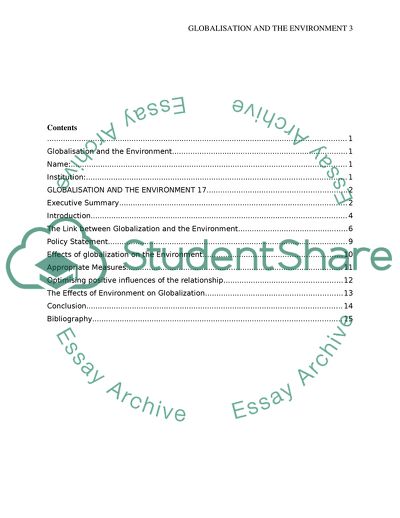Cite this document
(The Link between Globalization and the Environment Report Example | Topics and Well Written Essays - 3000 words, n.d.)
The Link between Globalization and the Environment Report Example | Topics and Well Written Essays - 3000 words. https://studentshare.org/macro-microeconomics/1809198-a-3000-word-report-that-summarizes-the-work-you-have-been-putting-together-in-weeks-1-12-of-term-2-2014-in-the-lectureseminar-programme-critically-evaluate-a-current-uk-government-policy-relating-to-a-social-group-both-of-which-are-impacted-by-glob
The Link between Globalization and the Environment Report Example | Topics and Well Written Essays - 3000 words. https://studentshare.org/macro-microeconomics/1809198-a-3000-word-report-that-summarizes-the-work-you-have-been-putting-together-in-weeks-1-12-of-term-2-2014-in-the-lectureseminar-programme-critically-evaluate-a-current-uk-government-policy-relating-to-a-social-group-both-of-which-are-impacted-by-glob
(The Link Between Globalization and the Environment Report Example | Topics and Well Written Essays - 3000 Words)
The Link Between Globalization and the Environment Report Example | Topics and Well Written Essays - 3000 Words. https://studentshare.org/macro-microeconomics/1809198-a-3000-word-report-that-summarizes-the-work-you-have-been-putting-together-in-weeks-1-12-of-term-2-2014-in-the-lectureseminar-programme-critically-evaluate-a-current-uk-government-policy-relating-to-a-social-group-both-of-which-are-impacted-by-glob.
The Link Between Globalization and the Environment Report Example | Topics and Well Written Essays - 3000 Words. https://studentshare.org/macro-microeconomics/1809198-a-3000-word-report-that-summarizes-the-work-you-have-been-putting-together-in-weeks-1-12-of-term-2-2014-in-the-lectureseminar-programme-critically-evaluate-a-current-uk-government-policy-relating-to-a-social-group-both-of-which-are-impacted-by-glob.
“The Link Between Globalization and the Environment Report Example | Topics and Well Written Essays - 3000 Words”. https://studentshare.org/macro-microeconomics/1809198-a-3000-word-report-that-summarizes-the-work-you-have-been-putting-together-in-weeks-1-12-of-term-2-2014-in-the-lectureseminar-programme-critically-evaluate-a-current-uk-government-policy-relating-to-a-social-group-both-of-which-are-impacted-by-glob.


